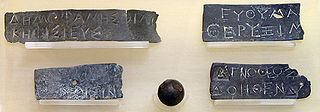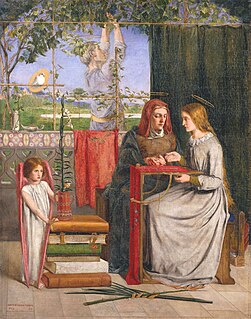Anastasia is a feminine given name of Greek origin, derived from the Greek word anástasis (ἀνάστασις), meaning "resurrection". It is a popular name in Eastern Europe, particularly in Russia, where it was the most used name for decades until 2008.

Cleisthenes, or Clisthenes, was an ancient Athenian lawgiver credited with reforming the constitution of ancient Athens and setting it on a democratic footing in 508 BC. For these accomplishments, historians refer to him as "the father of Athenian democracy." He was a member of the aristocratic Alcmaeonid clan. He was the younger son of Megacles and Agariste making him the maternal grandson of the tyrant Cleisthenes of Sicyon. He was also credited with increasing the power of the Athenian citizens' assembly and for reducing the power of the nobility over Athenian politics.

In Ancient Greece, a deme or demos was a suburb or a subdivision of Athens and other city-states. Demes as simple subdivisions of land in the countryside seem to have existed in the 6th century BC and earlier, but did not acquire particular significance until the reforms of Cleisthenes in 508 BC. In those reforms, enrollment in the citizen-lists of a deme became the requirement for citizenship; prior to that time, citizenship had been based on membership in a phratry, or family group. At this same time, demes were established in the main city of Athens itself, where they had not previously existed; in all, at the end of Cleisthenes' reforms, Athens was divided into 139 demes to which one can be added Berenikidai, Apollonieis, and Antinoeis. The establishment of demes as the fundamental units of the state weakened the gene, or aristocratic family groups, that had dominated the phratries.
Paeonia or Paionia may refer to:

Alimos is a south district of Athens and a municipality in South Athens regional unit, Greece. It was formed in 1968 comprising two settlements, the suburban seaside town of Kalamaki, and the inland community of Trachones. Alimos had 41,720 inhabitants in the 2011 census.
Balázs is a Hungarian equivalent of the name Blaise. Its feast day is on 3 of February.
The Synoikia was an ancient Greek festival held in Athens commemorating the political unification of Attica. It was also called the Thesean Synoikismos and the Feast of Union, and celebrated Theseus as founder of Athens and the goddess Athena as the city's patron goddess. The festival was celebrated in the month of Hekatombeion on the 16th. A two-day festival, on the 15th and the 16th was held every second year.

Anna is a feminine given name, the Latin form of the Greek: Ἄννα and the Hebrew name Hannah, meaning "favour" or "grace" or "beautiful". Anna is in wide use in countries across the world as are its variants Ana, Anne, originally a French version of the name, though in use in English speaking countries for hundreds of years, and Ann, which was originally the English spelling. Saint Anne is traditionally the name of the mother of the Virgin Mary, which accounts for its wide use and popularity among Christians. The name has also been used for numerous saints and queens.
Potamus is an anglicization of the Ancient Greek potamos (ποταμός) meaning river or stream; it appears in the name: Mesopotamia.
A paean is a song or expression of thanksgiving, triumph, healing or praise.
József is a Hungarian masculine given name. It is the Hungarian name equivalent to Joseph.
Live at the Greek Theatre is the fourteenth live album by American blues rock musician Joe Bonamassa. The album was recorded on August 29, 2015 at the Greek Theatre in Los Angeles and released by J&R Adventures on Blu-ray, DVD and CD on September 23, 2016.
The term Greek Catholic Church can refer to a number of Eastern Catholic Churches following the Byzantine (Greek) liturgy, considered collectively or individually.
Magda is a feminine given name, sometimes a short form (hypocorism) of names such as Magdalena, which may refer to:
Angele or Angèle may also refer to:
This page is based on this
Wikipedia article Text is available under the
CC BY-SA 4.0 license; additional terms may apply.
Images, videos and audio are available under their respective licenses.



